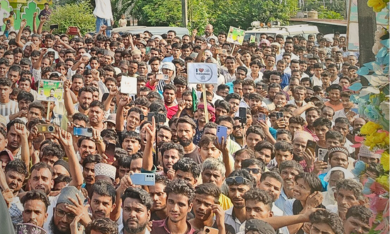How it began in Kanpur
The controversy started on September 4 during a Barawafat (Eid-e-Milad-un-Nabi) procession in Rawatpur, Kanpur. A group placed a banner reading “I Love Muhammad” along the route, removing a traditional tent that had been used in previous years.
Local Hindu groups objected, claiming a “new tradition” was being introduced. Police stepped in, restored the old arrangement, and clarified that the issue was about the location and placement of the banner, not the slogan itself.
On September 23, 2025, the Police Commissioner of Kanpur, Mr. Akhil Kumar, met with community leaders including Mufti Saqib Adib Misbahi, Hafiz Abdul Quddus Hadi, Qari Muhammad Sagheer Alam Habibi, and Maulana Asgar Ali Yaar Alvi, who expressed concerns about the handling of the incident. The commissioner clarified that a thorough investigation was underway, those found innocent would have their names removed, and strict legal action would be taken against the actual offenders.
FIRs and escalation
On September 9, Kanpur Police registered an FIR against 24 people (9 named, 15 unidentified) under charges of disturbing communal harmony. Authorities clarified that no one was booked for writing or displaying “I Love Muhammad”, but for shifting the traditional setup and damaging posters.
The matter gained national attention after AIMIM chief Asaduddin Owaisi posted on X (formerly Twitter), stating that saying “I Love Muhammad” was not a crime and tagging Kanpur police. His statement sparked wider debate across political and religious circles.
DCP Dinesh Tripathi reportedly explained that government rules prohibit introducing new customs into religious processions, which contributed to police action.
Spread to other districts and states
- Unnao (UP): Youths carried similar banners in rallies. Stone-pelting incidents led to FIRs and arrests.
- Maharajganj (UP): Police stopped a planned procession; 64 people were booked.
- Kaushambi (UP): A viral video showed objectionable slogans, leading to outrage and police action.
- Lucknow (UP): Muslim women held a peaceful demonstration outside Vidhan Bhavan.
- Nagpur (Maharashtra): Protests were organised by community leaders, stressing freedom of religious expression.
- Kashipur (Uttarakhand): An unauthorised procession turned violent with clashes and property damage.
Political and religious reactions
- Samajwadi Party: Criticized police handling and defended freedom of speech.
- BJP Leaders: Warned that law and order violations would face strict action.
- Religious Leaders: Maulana Sufiyan Nizami and the World Sufi Forum appealed for peace, urging communities not to let sentiments turn violent.
- AIMIM Leader Asaduddin Owaisi: Reiterated that Muslims should not be penalized for expressing love for the Prophet.
Summary: The “I Love Muhammad” controversy illustrates the delicate intersection of tradition, freedom of expression, and communal harmony. While the slogans themselves were not the cause of FIRs, procedural violations during the processions led to legal actions, protests, and national debate.


